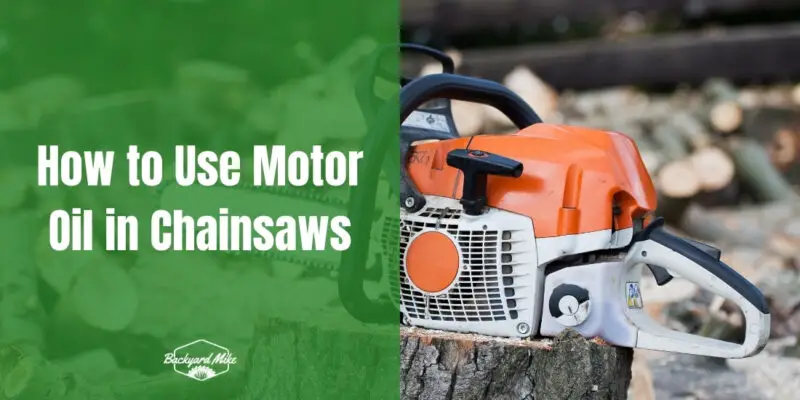To use motor oil in your chainsaw temporarily, select oil with appropriate viscosity for better lubrication. Apply minimal amounts and operate the chainsaw at reduced speeds to lower the risk of overheating and wear. Regularly check the chain and bar for signs of damage. Wear protective gear, use proper ventilation, and adhere to safe disposal practices to minimize environmental impact. Shift back to specialized bar oil quickly to maintain peak performance. Stay informed to guarantee chainsaw safety and efficiency.
Key Takeaways
- Use motor oil only as a temporary solution and transition back to chainsaw bar oil promptly.
- Select motor oil with appropriate viscosity to ensure better lubrication and performance.
- Operate the chainsaw at slower speeds to minimize friction and overheating risks.
- Regularly inspect the chain and bar for any signs of wear or overheating.
- Follow environmental guidelines for proper disposal of used motor oil.
Understanding the Differences Between Motor Oil and Chainsaw Bar Oil
When using a chainsaw, it's essential to understand the differences between motor oil and chainsaw bar oil to guarantee efficient operation.
Chainsaw lubrication is vital, and oil viscosity plays a significant role. Chainsaw bar oil, with its higher viscosity, is designed to handle high-speed chains and extreme friction, ensuring your chainsaw runs smoothly.
High-viscosity bar oil is essential for managing high-speed chains and friction, ensuring smooth chainsaw operation.
Unlike motor oil, chainsaw bar oil contains anti-fling additives that help the oil stick to the chain, even at high speeds. This specialized oil is formulated to reduce wear and prevent overheating, protecting both the chain and bar. Motor oil may be used in some machinery, but it lacks the specific additives needed for optimal chainsaw performance.
While motor oil focuses on engine lubrication, bar oil excels in managing speed and friction, enhancing the chainsaw's performance and longevity.
Always prioritize the right oil for maximum results.
Evaluating the Risks of Using Motor Oil in Chainsaws
While it might seem convenient to use motor oil in your chainsaw, doing so can lead to several risks that could compromise both the tool's performance and your safety.
Motor oil lacks the right consistency for effective lubrication, reducing lubrication efficiency. This can cause the oil to fling off during operation, leaving the chain insufficiently lubricated. The resulting friction and increased heat can lead to overheating, reducing cutting performance and wearing out components faster. Additionally, motor oil is non-biodegradable and harmful to nature, which poses environmental hazards if spilled. Insufficient lubrication also increases the risk of chain failure, potentially leading to accidents.
Guidelines for Temporary Use of Motor Oil
In some circumstances, you might need to use motor oil in your chainsaw, but it should only be a temporary solution.
Whether you're in an emergency or facing maintenance delays, motor oil can serve as a temporary oil alternative. Focus on lubrication efficiency by selecting motor oil with the right viscosity. Use the minimal amount necessary, and run your chainsaw at slower speeds to reduce splashing. Remember that proper lubrication is essential for optimal performance and longevity, so regularly inspect the chain and bar for overheating or wear. Remember, the goal is to switch back to proper bar oil as soon as possible to avoid long-term damage.
Consider other temporary oil alternatives like vegetable or biodegradable oils, which may provide better lubrication efficiency and lessen environmental impact.
Safety Precautions When Using Motor Oil
Using motor oil in a chainsaw requires careful attention to safety precautions to guarantee both your safety and the tool's functionality. Start by equipping yourself with protective equipment, including gloves, goggles, and a mask, to shield against oil exposure. Proper handling is essential; make certain the chainsaw is on a stable surface before starting. Maintain proper ventilation to avoid inhaling harmful oil vapors. Regularly inspect the chainsaw, checking chain tension, bolt security, and oil levels. Thinning engine oil with paraffin limits lubricating properties, which can lead to increased wear on the chainsaw. Keep a safe distance from fuel sources and ignition points. Be mindful of loose clothing, securing it to prevent accidents. Always engage the chain brake when not cutting. By following these steps, you'll guarantee a safe and efficient chainsaw operation, fostering confidence and belonging within the community.
Environmental Concerns and Disposal Practices
When using motor oil in chainsaws, it's essential to take into account the environmental impact and proper disposal practices. Motor oil, being non-biodegradable, contributes to environmental pollution. The fling-off from your chainsaw can contaminate the ground, leading to serious ecological issues. To mitigate these effects, always adhere to local oil disposal regulations. Chainsaws require lubrication for the guide bar and saw chain, which is essential for proper functioning and articulation. You should recycle used motor oil at designated facilities to prevent it from being classified as hazardous waste, which requires strict management. Avoid mixing it with any hazardous materials, as this complicates disposal and increases the risk of fines.
Monitoring and Maintenance Tips for Chainsaw Longevity
Proper chainsaw maintenance is essential for guaranteeing its longevity and efficient operation.
Start by inspecting the chain for performance issues like broken links or worn teeth, and make sure it's sharp for ideal cutting.
Inspect the chain for broken links or worn teeth, and ensure sharpness for optimal cutting performance.
Regularly check and adjust the chain tension; it should be snug yet movable by hand.
Use oil with the correct viscosity for your chainsaw to maintain smooth operation, and avoid motor oil—it can harm the machine.
Keep the oil reservoir topped off, and clean debris from oil ports to guarantee consistent lubrication.
Chainsaw chaps are an essential part of safety gear when operating a chainsaw, providing protection to the lower body from potential injuries.
Secure all bolts to prevent looseness due to vibration.
Regularly inspect fuel systems and clean air filters.
Follow these steps, and you'll not only improve your chainsaw's performance but also foster a sense of belonging in the chainsaw community.
Frequently Asked Questions
Can I Use Synthetic Motor Oil in My Chainsaw?
You can't use synthetic motor oil in your chainsaw. Despite its synthetic advantages, it lacks oil compatibility with chainsaws, missing essential tackifiers. Stick with chainsaw-specific oils to guarantee efficiency, reduce wear, and maintain your warranty.
Will Motor Oil Affect Chainsaw Performance in Cold Weather?
You'll notice motor oil's cold weather impact when its viscosity thickens, reducing effectiveness and increasing friction. This makes starting your chainsaw harder and lessens protection. Stick with winter-specific oils for better performance and a sense of community.
How Much Motor Oil Should I Use for a Standard Chainsaw?
Imagine your chainsaw as a loyal companion; using motor oil is like feeding it the wrong fuel. Instead, embrace the community's wisdom by sticking to recommended ratios and oil types designed for chainsaws, ensuring reliability and longevity.
Are There Any Brands of Motor Oil Better Suited for Chainsaws?
You've wondered about motor oil types for chainsaws. It's best to stick with bar oil, but if you're in a pinch, no specific motor oil brand recommendations exist. Always prioritize your chainsaw's health and community safety.
Can Motor Oil Void My Chainsaw's Warranty?
You're wondering if motor oil can void your chainsaw's warranty, right? It can. Warranty implications arise from oil compatibility issues. Using non-recommended oils might lead to disputes and cost you coverage. Stick to manufacturer guidelines.
Conclusion
When using motor oil in chainsaws, picture the machine as a finely-tuned engine requiring the right balance for peak performance. Motor oil isn't ideal, but in a pinch, it can work if you follow certain guidelines. Keep a close watch on the chain's performance, guaranteeing it's well-lubricated and not overheating. Always prioritize safety, wearing protective gear and disposing of oil responsibly. Regularly inspect and maintain your chainsaw to guarantee it runs smoothly and lasts longer.


